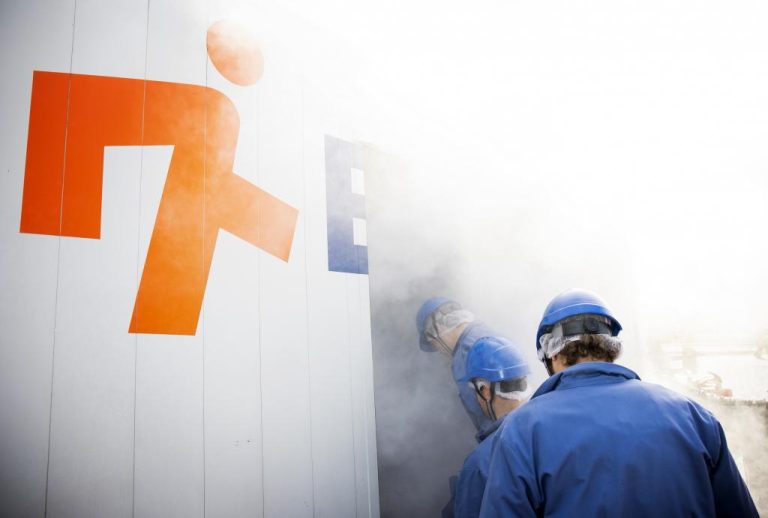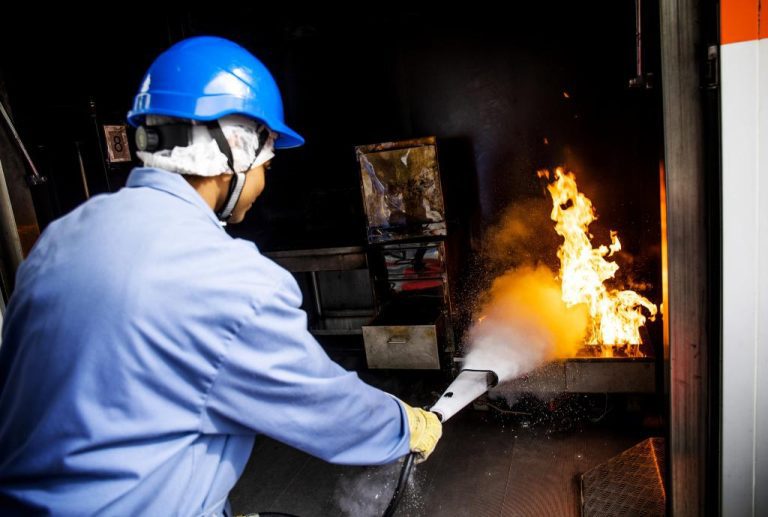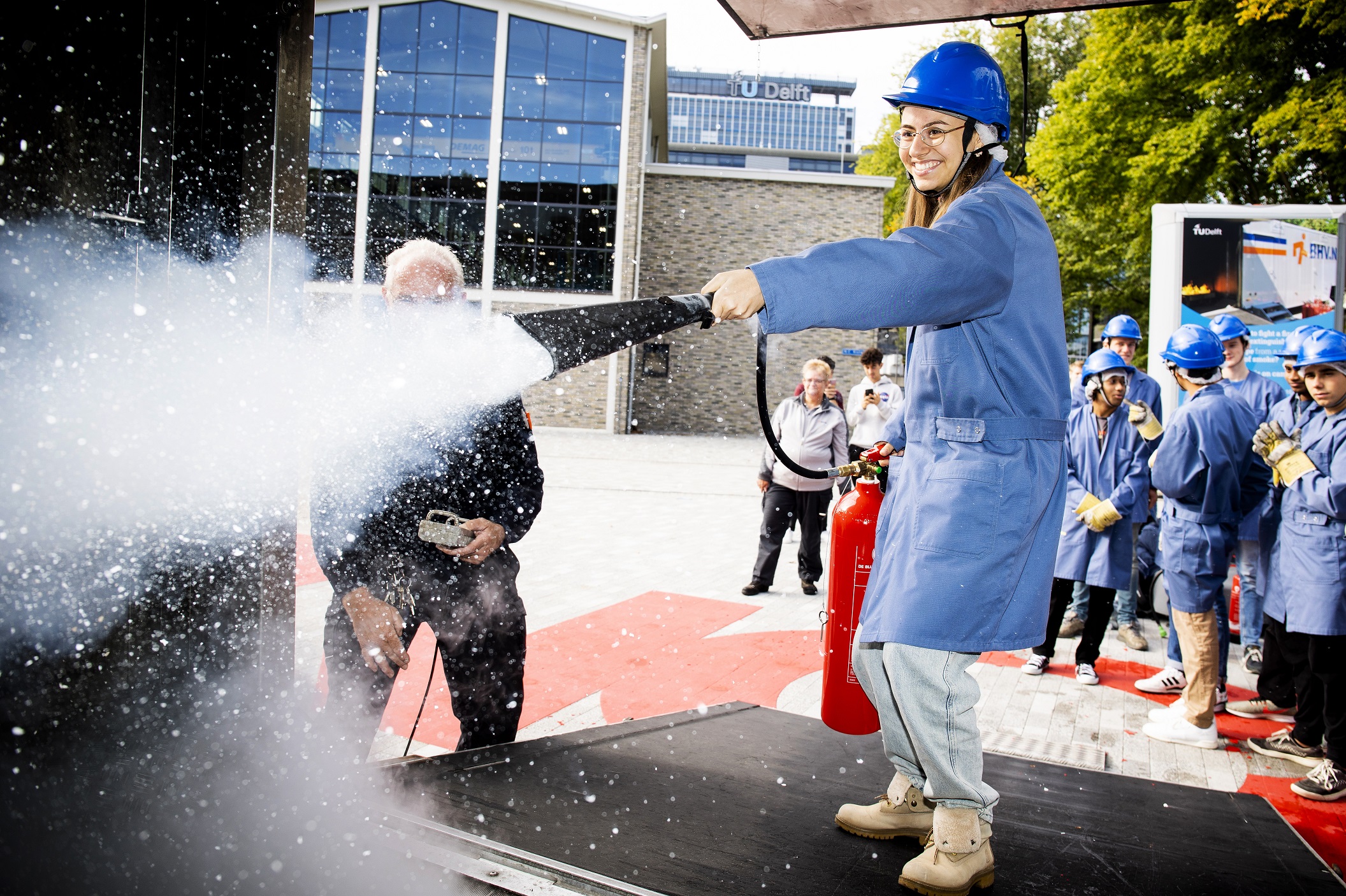Blocking the emergency exit or charging your phone while you sleep. Are you aware of fire risks in your student house and on campus?
A student practices with a foam extinguisher. (Photos: Guus Schoonewille)
How does a fire extinguisher work and what should you do if something catches fire? During the Safety and Security Week, company emergency responder instructors will give a crash course on fire safety at a mobile training location at the Echo academic building.
Dressed in blue overalls, safety gloves and a helmet, two students disappear into a dark cabin. Instructor Magda Valentijn of BHV.nl wishes them good luck and closes the door. The students have 30 seconds in which to find the exit in a warren of corridors, ‘otherwise they will be goners’, says Valentijn. “Don’t worry, it’s not real smoke. It’s only special effect smoke and the students can breathe as normal. But they do get to learn how hard it is to escape in such a situation. You can’t see anything and have to do everything by touch.” The students eventually make it out after one-and-a-half minutes. Not fast enough, they admit.
 Students enter the smoking maze.
Students enter the smoking maze.
The campus’ alarm number
Escaping from the smoke filled cabin is one part of this short fire safety course. The course was the idea of TU Delft staff member Arjen Keuning, fire safety specialist at the Campus Real Estate & Facility Management Department. “Students and staff should be more aware of fire risks, both at home and at campus. They usually only think about it when it is too late.”
Keuning is responsible for the fire safety in all the buildings on campus. His mission is to make students and staff more aware of fire hazards. It turned out to be a big job. “We can make a building fire safe, but its users can so easily put paid to this.” As examples he cites fire doors (doors that prevent fire from spreading to an adjoining space) that are not closed but are ajar, placing printers in front of fire extinguishers, and blocking escape routes. “If you are not aware of this, you just don’t see it. We can say that the doors should be closed, but it is better if people know why the door is there in the first place.”
He draws the students’ and staff members’ attention to the campus emergency number: (015) 27 88 888. “Should a fire break out on campus, don’t phone 112 but phone this alarm number. Our incident centre will be there faster than the fire brigade. And if there is a fire, always press the emergency button, even if the fire alarm is going off. This tells us the exact location of the fire and the fire brigade is also alerted.”
Foam fire extinguisher
Inge Steijger, a staff member at the TU Delft Library, is taking part in a repeat course for company first responders at the mobile training facility. Without needing to think about it, she puts out a practice fire with a foam fire extinguisher. “I recently had to put out a waste bin that caught fire,” she says. “There is a smoking ban on campus, but that does not stop people from still lighting up. They then throw the burning butt into a waste bin. Really stupid as it can cause a fire.”
Instructor Valentijn believes that everyone should know how to use a fire extinguisher. “Accidents can always happen,” she says.
 Do you know how to use a foam extinguisher?
Do you know how to use a foam extinguisher?
She talks about charging your phone while you sleep. “Some devices get really hot while charging. Do you know what happens to that hot lithium battery in your phone?” She puts her hands together and then yanks them apart. “Bang! An explosion.” Even leaving plugs in sockets is dangerous, she warns. “The electricity runs through the cable. Electricity is warm and there is always dust in the space around it. This can cause the cable to suddenly catch fire.” If you feel that your charger is very hot, it is time to replace it. “Always buy a plug that belongs to your device and not a cheap cable from the Action or AliExpress.”
“This is why smoke alarms are so important,” emphasise Valentijn and Keuning. “A smoke alarm saves lives. Your nose and eyes may be asleep, but your ears are not. Hang up an alarm and test the system regularly.”
They also advise students to thoroughly check that all the exits are free and there are fire extinguishers in the home. “Do a fire drill with your housemates. Blindfold each other and see if you can find the exit.”
Winter months
Do you use an electric blanket to stay warm in winter? Make sure that you use it safely. “Only put the blanket on when you are around and turn it off when you get into bed.”
What about swapping a heater for ‘heating’ from terracotta pots and tea lights (in Dutch)? Valentijn does not believe this is a good idea. “It is a myth that it keeps you warm. Apart from that, it is a fire hazard.”
- Read more about the Safety and Security Week.
- Report an incident or emergency on campus on the emergency number:
(015) 2788888. The number is available 24 hours a day, seven days a week. - Click here for more tips on fire safety in your home.
Do you have a question or comment about this article?
m.vanderveldt@tudelft.nl


Comments are closed.